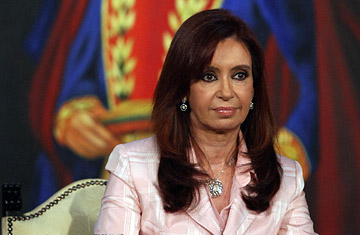
Argentine President Cristina Fernandez takes part in a ceremony at Miraflores presidential palace in Caracas.
The careers of Hillary Clinton and Argentine President Cristina Fernandez de Kirchner always seemed uncannily similar — and that's especially true at the moment. Last year both women were riding high; but as Clinton appears to be fading from the U.S. presidential race, Fernandez's presidency is doing its own plummeting. Indeed, poll numbers for "Cristina", as she is popularly known, are into George W. Bush territory barely six months into her administration.
Last October, Cristina Fernandez, the Peronist senator hailed both as Argentina's "New Evita" and "The Latin Hillary" won the elections with 45% of the vote, easily outpacing the other 13 candidates. But now, old ghosts from Argentina's troubled 1970s and '80s — inflation, class conflict and the threat of coups — have returned. City streets and national highways have become the stage for the kind of unrest that seemed unthinkable when Cristina succeeded to the office vacated by her husband, outgoing President Nestor Kirchner, who instead of seeking a second term after one of the most succesful presidencies in Argentina's history, turned over the reins of a burgeoning economy to the nation's First Lady. At that point, state coffers were bursting with foreign reserves, after a string of four uncharacteristically uneventful years — following a financial crisis that claimed a President in 2001 and resulted in five men holding the office in the space of just two weeks.
But while state coffers remain full, the economy is troubled. A coalition of farmers and farm owners has staged disruptive demonstrations against the President and her policies for 80 days now, garnering a large degree of public support, fueled largely by frustration at the government's inability to deal with inflation. Says Ricardo Gomez, a farmer from the central province of Cordoba: "Cristina projected the promise that she could continue to provide the economic bonanza while distancing herself from Kirchner's authoritarian streak, but she turned out to be even tougher than her husband." Her government has called the farmers "oligarchs" who wish to throw her out of office.
President Fernandez argues that inflation has been "overstated" and that independent estimates of an annual 25% rise in prices are "not serious." The government claims the inflation rate is only 9%. But inflation is probably the main reason for the drop in her poll ratings, says Sergio Berensztein, whose polling company, Poliarquia, has recorded the plummeting numbers of the President: "It is a sudden drop of 20 points in the two months since the farm crisis began." While the public mood began to shift at the end of her husband's tenure, Berensztein says several factors gave it impetus after she took office: "inflation and the government's state of denial regarding it, her confrontational attitude during the farm crisis and her [failure] to deal with corruption." According to Poliarquia, Cristina's approval has dropped from 51% when she assumed office six months ago to 21% today. The government says Poliarquia's polls and similar ones showing a downturn are "fake."
Cristina's confrontational style brooks no opposition. The President and her husband rarely give interviews and discourage their officials from speaking to the press. Meanwhile, the President ditched her star economy minister, Martin Lousteau, a month ago after he put forward a 13-point plan to reduce public spending and discourage consumption to put a damper on prices. That plan ran counter to the combination of high growth rates and price caps favored by Fernandez and Kirchner.
"It's so difficult to negotiate with them; they're mentally stuck in the 1970s and '80s," says Atilio de Angeli, one of the leaders of the farm revolt. Indeed, while the farmers claim to want to negotiate with the government, they say the government does not want to reciprocate. "This is not a farm protest; this is a lockout," growled Peronist legislator Carlos Kunkel, an unofficial spokeman for the Kirchners, comparing the farmers to company owners who shut down their factories rather than negotiate with striking employees.
And while it is odd for public disaffection to coalesce around farm owners, an anti-Cristina rally organized by the farmers a week ago in the city of Rosario drew between 200,000 and 300,000 people. That kind of turnout hit a sore spot with the presidential couple. Former President Kirchner tried to denigrate it by comparing it to the rallies against Juan Peron in 1945 — which, though large in number, failed to prevent Peron's rise to power along with his wife Eva, who is still widely revered in Argentina. The farmers scoffed Kirchner's belittling. "Make no mistake," said farm leader Carlos Llambias at the rally, "the ruling couple are no Peron and Evita."
